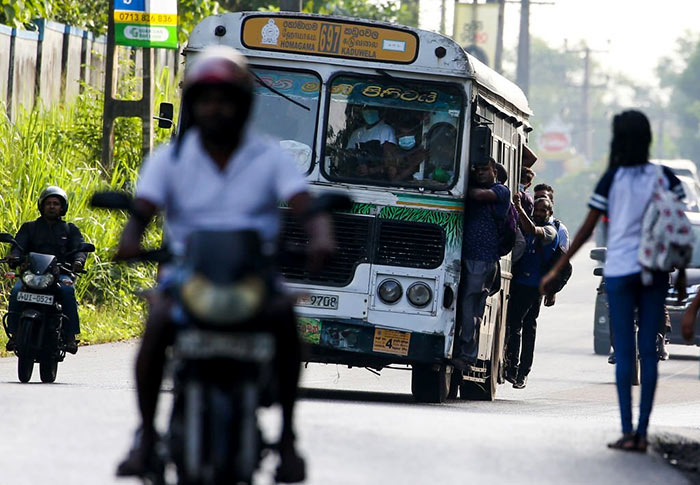Sri Lanka announces four-day work week to curb food and fuel crisis

Passengers travel on the door of a public transport bus during a fuel crisis in Colombo on June 15, 2022. (Photo by Pradeep Dambarage / NurPhoto via Getty Images)
Shorter work weeks aimed at boosting worker productivity and happiness are catching on in parts of the world like Iceland and the United Kingdom.
But in crisis-hit Sri Lanka the concept is more about coping with crippling food and fuel shortages.
The South Asian country, struggling with the shortages amid its worst economic crisis in decades, announced on Tuesday that public sector workers will be given Fridays off for the next three months, without a cut in pay, to allow them time to grow their own crops.
“It seems appropriate to grant government officials leave of one working day … to engage in agricultural activities in their backyards or elsewhere as a solution to the food shortage that is expected,” the Department of Government Information said on Tuesday.
It said the shorter week will also benefit workers affected by power cuts and transport disruptions caused by the food and gas shortages.
There are thought to be up to 1 million public sector workers in the country. However, the four-day week will not apply to “essential services” staff working in hospitals and ports or those in the power and water sectors.
The government, which is in talks with the International Monetary Fund (IMF) for a bailout package this month, is also keen to encourage people to take jobs abroad so that they can send money back.
It said public sector workers will be granted leave without pay of up to five years “without prejudice” if they decide to take up employment overseas.
Chaos and uncertainty
The island nation with a population of 22 million is in the midst of its worst financial and political crisis in decades. Public anger boiled over in April, when protests turned violent and threw the government into disarray. Several government officials, including the prime minister, have stepped down.
For many Sri Lankans, daily life has become an endless cycle of chaos and uncertainty since the crisis began.
Snaking queues for basic supplies like food and gas form across the country on a daily basis, and many shops have been forced to close because they can’t run fridges, air conditioners or fans.
Soldiers are often stationed at gas stations to calm frustrated customers who line up for hours in searing heat to fill their tanks. Some customers have even reportedly died while waiting.
Government critics have questioned how much difference the four-day week will make, saying that while state sector employees typically live far from Colombo most use public transport for their commute.
They also say most are relatively poor and do not own their land, so are unlikely to cultivate their own food.
(Source: CNN)
Latest Headlines in Sri Lanka
- Sri Lanka launches advanced train driver simulator training programme January 26, 2026
- Mobile labs to catch drug-impaired drivers in Sri Lanka January 26, 2026
- Sri Lanka crosses $1 Billion FDI mark in 2025, signals strong investment recovery January 26, 2026
- STF arrests key underworld drug operative with Rs. 30 Million ICE haul in Bambalapitiya January 26, 2026
- GMOA launches island wide trade union action warning of health service collapse January 26, 2026


